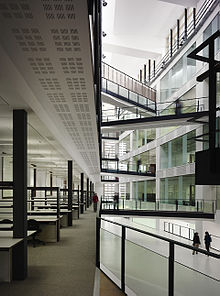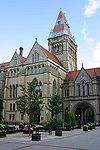- Manchester Centre for Integrative Systems Biology
-
Manchester Centre for Integrative Systems Biology 
Established 2005 Director Professor Hans V. Westerhoff Location Manchester, England Campus University of Manchester campus Website http://www.mcisb.org The Manchester Centre for Integrative Systems Biology (MCISB) at the University of Manchester, England has been awarded £6.4M by the BBSRC and EPSRC to pioneer the development of new experimental and computational technologies in Systems Biology, and their exploitation. It is one of six BBSRC Integrative Systems Biology Research Centres in the UK. Through its Doctoral Training Centre, it is also involved in teaching the theoretical and practical aspects of systems biology.
The MCISB is based on the second floor of the Manchester Interdisciplinary Biocentre (MIB).
Contents
Areas of research
The MCISB aims in pioneering the development of new experimental and computational technologies in Systems Biology and aiding in their exploitation. Systems Biology, being a rather new field, is developing and expanding rapidly. The common denominator of the research carried out in this field is that it co-evolves mathematical and experimental descriptions of interacting parts of organisms, e.g. global datasets of variables such as transcripts, proteins or metabolites, and seeks to integrate these different levels of information. The MCISB is intended to provide a hub for cutting-edge Systems Biology research, acting as a focal point for the creation of the necessary ideas and infrastructure, and establishing new methods and routines.
In the research to be carried out at the MCISB, the baker's yeast (Saccharomyces cerevisiae) will initially be used as a model organism, because it is highly amenable to genetic manipulations and to high-throughput technologies, thus offering an excellent starting position for demonstrating the principles and methods of Systems Biology.
A key focus of the MCISB is the development and application of high-throughput methods for the quantitative measurement of kinetic and binding constants on a genome wide scale. A second challenge is the mining (both text mining and database mining) of existing sources of information, and integrate these with the experimental data generated within the MCISB. The resulting dataset will be used to construct predictive mathematical models of metabolic pathways, employing both forward kinetic modelling (systems of ODEs) and inverse modelling. This should lead to computer models of (parts of) living cells. Some models are already available for in silico experimentation, others will be developed within the centre.
Members
 The atrium of the MIB, where the MCISB is based.
The atrium of the MIB, where the MCISB is based.
The MCISB consists of a Management Team of nine Principal Investigators that steers the Centre, and an interdisciplinary team employed as Experimental Officers of the Centre.
Principal Investigators (Management Team)
- David Broomhead (Chair in Applied Mathematics; Director, Turing Institute)
- Carole Goble (Professor of Computer Science)
- Roy Goodacre (Professor of Biological Chemistry)
- Simon Hubbard (Faculty of Life Sciences)
- Pedro Mendes (Professor in Computational Systems Biology, MCISB)
- Norman Paton (Chair in Computer Science; co-Director, Information Management Group)
- Hans Westerhoff (AstraZeneca Professor of Systems Biology, School of Chemical Engineering and Analytical Science; Director, MCISB)
- Anthony Whetton (Head of School of Cancer & Imaging Sciences and Professor of Cancer Cell Biology)
- Michael White (Professor of Life Sciences)
Project Manager
- Daniel Jameson
Experimental Officers
- Kathleen Carroll
- Rick Dunn
- Ettore Murabito
- Kieran Smallbone
- Neil Swainston
Former members
- Neil Hayes
- Naglis Malys
- Evangelos Simeonidis
- Irena Spasic
- Dieter Weichart
- Jill Wishart
References
The website of the Manchester Centre for Integrative Systems Biology.
See also
External links
- MCISB web site
- BBSRC web site
- Manchester Interdisciplinary Biocentre – official website
Categories:- Research institutes in England
- University of Manchester
- Systems biology
- Systems science institutes
Wikimedia Foundation. 2010.

